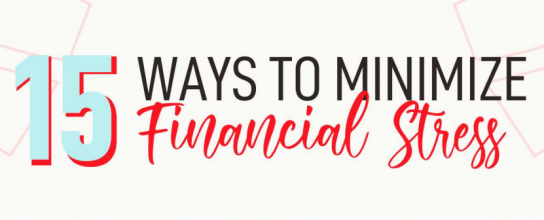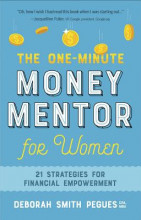Excerpt:
Deborah Pegues: Even with people who don’t have enough, you’d be surprised what, how that impresses God when we help somebody even out of our own need, and just like that widow in 1 Kings 17, who told Elijah, “Listen, I don’t … I just have enough for me and my son, and we’re gonna eat it and die,” and you know what? The Bible says that He p- supplied her need throughout that famine.
End of Excerpt
John Fuller: That’s Deborah Pegues, and she joins us today on Focus on the Family. Your host is Focus president and author, Jim Daly, and I’m John Fuller.
Jim Daly: Uh, John, with last year’s COVID shutdown and other uncertain times we’re facing, uh, we’ve seen a rise in unemployment, devastating financial crisis, and many other things that are really impacting us, and as we kick off the new year, we’re coming out of Christmas, and, probably, some people have blown their Christmas budgets, and, now, we’re getting the credit card bills for those things. We want to stop and remember what God has to say-
John: Mm-hmm (affirmative).
Jim: … about money, and He says a lot about it. Uh, here at Focus on the Family, we want you to live freely in Christ. Uh, that’s what it’s all about. Uh, he died on the cross so that you may live abundantly in him, but there’s principles that we have to apply in order to do that, and, today, we’re gonna help, uh, at least in this area, the finances, give some insights that I think are really gonna help.
John: Yeah, and we have Deborah Pegues, one of our most popular guests with us, uh, once again, as I said earlier.
Jim: Yay.
John: Deborah is a certified public accountant and, uh, a certified behavioral consultant, as well. She’s a Bible teacher, an international speaker. She writes books left and right, and we’re-
Jim: (laughs)
John: … talking about one of them, called 30 Days to Taming Your Finances: What to Do and Not Do to Better Manage Your Money.
Jim: Deborah, welcome back.
Deborah: Thank you so much. Thank you for having me.
Jim: Yeah. It’s so good, even remotely. We have to do this right now, but we’re so grateful that you’re making the time there in Southern California to join us. Uh, I mentioned, uh, the Bible offers guidance when it comes to how we handle our finances. Let me be the antagonist. Really, something written 3,000, 2,000 years ago, it has some kind of bearing on our finances today? Really?
Deborah: Absolutely. Absolutely, and I’m so glad that that aged book, that, as they say, aged wisdom, is here for us, and I have found it to be true. Uh, I’ve been … I’m 70 years old. (laughs) So, I have known the Lord in the area of finances ever since I was old enough to have money on my own, uh, as I say, on my own, and I tell you, this is the time, more than ever, that we gotta make God our partner.
Jim: Why-
Deborah: He’s gotta be our partner.
Jim: Let me ask you this. Um, why is stewardship of financial resources, why does that matter to God?
Deborah: Because, you know, Jesus had talked about money actually more than He did salvation. We knew … We know that salvation was important, but money is a tool that lets us really … It’s a spiritual tool, and it’s important because everything belongs to God. We’re just managers, and if we don’t start out with that mindset-
Jim: Huh.
Deborah: … we’re gonna hoard it, we’re gonna handle it like it’s ours, we’re gonna be anxious when we see it getting away from us, appear to get away from us. So, it’s important to God because it’s His resources. That’s why it’s important. (laughs)
Jim: Yeah, no, and that’s great to state it in a straightforward way like you have. In the face of the shutdown, what we just mentioned, uh, kind of the environment we’re in, unemployment numbers kind of vacillating up and down and up again, uh, countless families are fighting just to get food on the table. I feel so bad for young people today, you know, the teen worker, the 20-something trying to find a job that they can get their career started. It’s such a mess, uh, given the COVID situation. Where do people find hope in that, uh, when you’re not getting a job and money’s tight?
Deborah: Well, you’re gonna have to just believe that God is going to provide, and I don’t wanna sound theoretical in this, but I always tell everybody, “Look, just stop and take a deep breath because He promises to meet all of our needs according to His riches,” and I really just wanna kind of park there for a minute because we get really caught up in looking at what we have available, what’s not available, what we have left, what’s not left, and all of a sudden, we take full responsibility for our financial wellbeing, and I’m here to tell you this morning, ’cause I’ve been in that place, (laughs) I’ve been in that place where you c- o- I had to sell stamps just to have some (laughs) money, or my budget for Sunday dinner was a dollar. I know what that feels like. As Paul said, “I know how to abound, and I know how to be abased,” and I have to tell you, it’s your mindset. Any time you’re-
Jim: Hmm.
Deborah: … going through an uncertain time, a stressful time, the level of stress that you feel is a direct proportion to what you’re believing about God, and so I’ll just, I’ll … I said to myself the other night, “Just lose your mind for a minute. Let’s just put it on pause.”
Jim: (laughs)
Deborah: “Go to another realm. Let’s go into that faith realm and begin to expect God to show Himself strong.”
Jim: Well, it’s so true. I mean, you, you can work yourself into anxiety and even depression, I think, when it comes to finances. It has that much influence in our lives. Uh, let’s get to some practical steps to taming finances, like your great book, 30 Days to Taming Your Finances. Uh, you suggest, uh, seeing where you stand and preparing a plan, and I think the practical question is, what does that look like?
Deborah: What does it look like? You ever been to a mall? Of course, you have, but if you haven’t, I have lots of experience. The first thing you see is a sign that says, “You are here-”
Jim: (laughs) That’s right.
Deborah: … if there’s a map. “You are here.” You find out where you stand, and then you’ll know how far you have to go to get to your destination, meaning let’s say I, my income is now short by 500 a month or 1,000 a month. Now, you don’t wanna get stuck there. You just need to see where you stand because there may be some areas where you can cut back. I maintain we can probably all live off of just a little bit less, you know, some of the little luxuries or the things we do daily, but it’s important that you know where you stand. In fact, there’s a scripture that says, “Be careful to know the state of your flock.” Know at any point in time where you are so that you can, uh, begin to identify and eliminate behaviors that may not be serving you financially.
Jim: With all of the people that you have worked with, uh, I would think the planning side of it is far more comfortable for some and far less comfortable for others. Uh, speak to that idea of having the plan-
Deborah: Mm-hmm (affirmative).
Jim: … and how do you get going if you’re not a planning person?
Deborah: Well, it is quite simple. You don’t need a fancy program. You need some pencil and paper-
Jim: (laughs)
Deborah: … (laughs) and just get … Really, you can just get down to brass tacks this way. Write down … You know what you have coming in. Look at what you’ve spent. If you don’t know, just start to make a log of it, but you have an idea. You know your core expenses. You have to know that, and then you say, “Okay. What … Where is the shortfall? Is there a shortfall? What else can I do to make it up?” You only have two options here. You can increase your revenues or decrease your expenses. It’s usually easier to decrease your expenses, but many of us have skills, talents, that we hadn’t thought about putting to work, and so this is time to say, as Elijah told the woman when she went to him and said, “You know, my husband died,” and he said, “What do you have in your house?” “You know, I’m in debt. The creditors are coming. They’re gonna take my kids.” “What do you have in your house?” And I say that to everybody. “Do you have a skill or something that perhaps you’ve treated it as a hobby, but now you can begin to charge for those things.” And so look for ways to do that, and if you don’t have that, listen, you are not on your own. God is your Father. He’s responsible. Good fathers take care of their children. (laughs)
Jim: Yeah. No. I appreciate that, and I think that’s always kind of the foundation to remember. It gives you the ability to, um, you know, have that joy in circumstances that, uh, may not suggest you should be joyful, but that’s the life of the Christian, right? We’re content-
Deborah: It, it is.
Jim: … in all ways.
Deborah: Yes, and, and we gotta keep that in mind, Jim. This is so important right now because depression-
Jim: Yeah.
Deborah: … uh, everything is at an all-time high, and even among Christians, and, and I’m thinking, you know, I tend to be a joyful person, but all of my engagements were canceled, and I thought, “Okay, Lord. It’s in your hands because all the days ordained for me were already written in your book. This day didn’t catch you by surprise, you know?”
Jim: Right. No, it’s true.
Deborah: He has a plan. He has a plan.
Jim: He has a plan, and we just need to, you know, walk with Him in that. Let me ask you, your wonderful husband, Darnell, so often, money affects marriage more than almost anything. Um, how can we be mindful of how our mismanagement of money is affecting our relationship with our spouse, and how do we get in sync with our spouse?
Deborah: Well, we’re gonna have to set some common goals, and that’s the fastest way to start because finances really are the source of contention in most marriages, and so we’ll say, “What is our long-term goal?” Let me give you an example. Let’s say one of our goals is just to make sure that we have accumulated at least two to three months of living expenses. So, whenev- whatever we’re doing should be driving us towards that goal. So, if somebody’s gonna run out and buy some luxury upper end fishing poles … My husband is currently-
Jim: (laughs)
Deborah: … at the fishing thing right this minute.
Jim: Just to come up with an example here. (laughs)
Deborah: (laughs) That’s where he is this moment. (laughs) B- but, you know, you have to say, “Now, is that gonna get us towards our goal. Let’s, let’s agree that this is where we’re going,” ’cause how can two walk together unless they agree? And so you gotta sit down, write it down, and say, “What’s our goal?” And make every decision, make sure it’s not taking you away from your goal. It can be hard, but if you really talk about what’s driving yours expenditures, you’re gonna find you’re gonna get on a path to agreement.
Jim: Uh, Deborah, sometimes, that communication can be really difficult in a marriage. I mean, you’re saying it … You’re a trained CPA, and I can imagine it’s put a little stress into your marriage when Darnell’s saying, “Hey, I’d like this, you know, this luxury item,” and you’re going, “Honey, seriously, really?” And you’re giving him that look, like you’re looking at me right now. (laughs)
Deborah: (laughs)
Jim: And, I mean, so that can either start f- some friction between you, or it’s achieving the right goal, which is accountability. So, how do we make that communication a little easier in our marriage so it’s not abrasive?
Deborah: Well, we do it by, uh, reminding ourselves of what the goal has been. So, with Darnell and me, we know that we’re gonna pay 10% of our income to the church. So, that goal has been met. We know that we’re gonna need … we would like six months’ living expenses in the bank, and that sounds excessive in this environment, especially with everything being canceled, but we also have a, a formula. We sold some, we spend some, we save some. Those are our three S’s. When I say, “We sold some,” we give to others. We make that a priority, give to the church, and then we know that we save some, and Darnell reminds me all the time, “We can’t save it all.”
Jim: (laughs)
Deborah: (laughs)
Jim: I like Darnell.
Deborah: We can’t save all of it, and I’m thinking, “Yes, but, you know, I know they say, ‘Have six months in the bank,’ but I want two years. Suppose we can’t work for two years?” “Well, that doesn’t make sense.” I know it doesn’t, but, in my head, uh, I have to peel the onion. What’s causing you to think that you can’t trust God-
Jim: Mm-hmm (affirmative).
Deborah: … that’s there gonna be such a shortfall that you’re gonna have to hoard money? And so, you know, you have to be truthful about that? And I know that mine was driven by the fact that I had a mother that was not empowered and a father that was abusive, and so I saw her not ever have enough money, and I kind of bowed inwardly that I’d never be in a position where I’d never had enough money, that I couldn’t put my hands on money and run away if there was abuse.
Jim: Mm-hmm (affirmative). [crosstalk 00:10:52]-
Deborah: So, you could … You have to understand what’s driving those financial mindsets.
Jim: Well, and that, that, I mean, that’s powerful, that statement. Uh, the things you learn as a child, those, um, you know, pains, uh, end up being your passions, like so many say, and that’s what you’re describing. Let me ask you about emotional spending. You’re kind of touching on that. I would think that, you know, you gotta pay rent, you gotta buy food. Those things are automatic, but it’s that other place where that emotional spending occurs, and some people … Let me say it this way. Correct me if you think I’m wrong, but we can medicate with our spending because it makes us feel good to buy something new.
Deborah: Yes, Jim, and, listen, I believe emotions are at the root of all spending, even the saving. It’s that the emotion is at the root of it. I … It was fear, and, you know, I’m ready, real, recognizing that fear at the base of my wanting to save, but, you see, even now, peo- a lot of people are spending out of boredom. We’re at home, and I’m, I’m sounding like your wife. I’m ordering 100 little s- low-cost items. I have that truck coming here every day-
Jim: (laughs)
Deborah: … from, um, um, you know, the place. (laughs)
John: (laughs)
Jim: Yeah, one of those places-
John: Yeah.
Jim: … one of the many places.
Deborah: Yeah. So, I’m thinking, “Well, you know, what’s driving this? Well, I’m bored. So, I try a new type of green screen.” You have to identify the emotion. Here’s the point. Sometimes, you’re spending out of anger, out of frustration. You say, “M- I have very little money, anyway. I may as wells just go on and enjoy myself and have a great steak dinner.” And so you gotta understand, okay, is that gonna get you towards your goal? I am very big on people being focused on their, where they’re trying to go. So, you gotta look at it. Am I depressed? Am I just frustrated? So, you have to identify the emotions so that you can say, “Yeah, that’s why I’m spending. I’m upset with somebody.”
Jim: Hmm.
Deborah: And so if you’ll be truthful about that and find an alternate way to deal with it, then you can stop, think, and pray before you pay. (laughs)
John: (laughs) I appreciate-
Jim: I like that.
John: … so much what Deborah Pegues is sharing today on Focus on the Family, and we’re talking about some of the concepts in her great book, 30 Days to Taming Your Finances: What to Do and Not Do to Better Manage Your Money. I so appreciate the ideas she has here, and, um, I wanna encourage you to get a copy of this book. We’ve got it at focusonthefamily.com/broadcast, or call 800, the letter A, and the word FAMILY.
Jim: Uh, Deborah, let me ask you about this, uh, our culture, and let me … Uh, uh, we, you know, we are aired globally. So, I’m talking primarily about the Western culture, the US, Canada. Uh, y- you know, we seem to not value contentment, and, uh, you know, the marketers, they do a number on us. They make us feel like, you know, my car is eight years old, and it does kind of have some weird sounds coming from it. I probably need a new one when it was just a marble in your wheel or something. Who knows? But the point of that is these tensions are … We’re fighting these tensions constantly. Do we need something new, or can we get by with what we’ve got. That idea of contentment, speak to that and the importance of it.
Deborah: Yes. You know, every commercial is designed to make us feel inadequate. We need something that we don’t have. In fact, Jim, I’m on high alert to say, “What are they trying to sell me? What are they trying to make me feel bad about (laughs) myself-
Jim: Yeah.
Deborah: … because, because if you understand the motive, but, listen, w- and I don’t wanna sound like a walking Bible, but Godliness with contentment is great gain. You’re gonna be so much further ahead of the game if you look at that and ask God to give you the ability to be content, and, and that comes out of gratitude. I mean, I get into bed every night and just thank God for the bed. I know there are homeless people. LA has a huge homeless problem. I don’t need a new toy. The computer that I’m using right now is a 2015 model, and I’m thinking, “Oh, that 2020 is out, but I don’t … It has more bells and whistles. Do I need them? No. Does this one serve my purpose? Yes.” So, I have to talk to myself. I have to be personally responsible for guarding my heart so that that kind of discontent doesn’t enter in and make me spend money because I … it’s gonna make me better.
John: Mm-hmm (affirmative).
Jim: Right. No, I-
Deborah: It’s gonna take me to another level. I’m gonna be unique now. (laughs)
Jim: I totally get that, and, you know, unfortunately, the church being in the culture, that seeps into the church, as well, and, you know, we sometimes don’t struggle enough with that decision that you’re talking about, uh, but I wanna stay on the God thing because it’s important, and we’re Christians, and we believe in Jesus, and it’s important to have Him at the root of everything. How does prayer and/or our relationship with God affect the way we, we manage our finances? How do we put Him kind of in the lead rather than an afterthought?
Deborah: Well, Jim, I always say, and I’ll say this quickly, that, “Life is like a stool. There’s a base, which are your spiritual beliefs, and four legs, and one of those four legs is the financial,” and I’ll just talk about that one real quick. Well, I’ll tell you the rest of them are, uh, physical, relational, emotional, and financial. Every aspect of our life comes out of a belief system, how we manage those. What I have to believe about God so that it impacts my finances and informs my financial decisions, that’s why when I know that I, I can be content, that’s gonna inform a financial decision. That’s why I have to guard my time with God because, if I don’t have that mindset, I’m gonna be influenced by what I just saw on the commercials, and so that’s why I tell everybody, “Guard your prayer life because it’s gonna determine your mindset. It’s gonna determine what you believe, and those beliefs will inform every decision, financial and other.” So, that’s why it’s important.
Jim: Yeah, and I so appreciate that, and, again, it’s a discipline, uh, the spiritual discipline of, uh, putting God in the right place, uh, and not really putting Him there, but honoring Him to be there.
John: Mm-hmm (affirmative). Yeah.
Jim: And, uh, let me ask you, too, uh, you know, given what we’re talking about with the aftermath of COVID and the effect of the economy and all the uncertainty that we’re feeling in that regard, there seems to be a lot of, y- uh, negativity around us. What are some ways we can refocus and become just more positive and more God-honoring in how we deal with people and not, uh, kind of take the bait to just be down and, uh, sour about everything going on. It’s so easy to go there.
Deborah: It is so easy, and especially now having just finished a political election, but I, I, um, I like Philippians 4:8 as my sifter, and I always tell everybody, “Mind management, thought management is key right now,” because it’s gonna determine your mindset on a daily basis. So, I like to ask people to use Philippians 4:8 as their sifter. Whatever things look good and positive and of a good report, think on those things, and you have to really ask yourself, when you find yourself being negative, “How did I get here? Have I been watching too much negative news? Uh, do I spend too much time analyzing my situation so that my, the facts and the reality of my situation have just spoiled my faith? It’s just … It’s spoiled it.” (laughs) And so I have to ask myself … I do a lot of self-quizzing because I wanna make sure that I have a up mindset because people need to see Christians going through this season in a positive, powerful way so they can say, “I want what you have,” but if we’re at the, “Ain’t it awful?” party, too, then we’re gonna have to really know that we’re not being the greatest example. So, that’s why I’m trying to teach myself, remind myself, to cast down every imagination of negative thoughts, negative scenarios, and so I ask myself then, “Okay, where am I getting that negativity from?”
Jim: Yeah.
Deborah: “What is it I’m focusing too much on my reality?”
Jim: Uh, Deborah, you, you mentioned it’s important for us to let our needs be known. I mean, that’s typically very uncomfortable for a human being, but you do encourage people to ask if you’re in a situation that you need help. I guess the question is, why is that so hard for us to do?
Deborah: Well, because we wanna ap- appear to be self-sufficient. I think if there’s one thing we can learn to do, it’s just really declare our dependence on God and know that He uses people, He gives you favor through people, and so I’m just … I, I try to remember that. God gives me favor through people. So, I let it be known. “Hey, I’m available.” I’ll tell a pastor, “You know, and, uh, and just in case you have, uh, you don’t wanna do your Wednesday night service, I’m available to teach. I have … This is what I teach on. It’s okay to do that. You can ask.” You have not because you ask not. It’s okay to ask. It’s Godly.
Jim: Yeah, no. It’s good. Now, the, uh, kind of the big stinger here in January, typically, well, I said it at the top of the program, it’s when those credit card bills are coming due (laughs) after the Christmas spending spree. Uh, what options do families have when it comes to managing credit? And you gotta be so careful nowadays that you just don’t overspend.
Deborah: Yes, but a lot of people are having to depend on their credit cards just to survive. So, some of the old rules, uh, may not apply right now, you know, like never having a, leaving a balance on your credit card. Well, it’s just not possible for some people right now to pay off their balances, but I always say, “Make sure you’re making the minimum payment,” because even during this season where you’re having to live on credit cards, you wanna guar- guard your credit score so that you don’t come out of this, uh, in a way that’s not, uh, to your advantage, and so you can always call your creditors up and ask them for low, the, uh, especially the, the credit card people, ask for lower interest rates, ask for maybe some time more to pay on the card. You’d be surprised at what they’re doing. Some people are even extending your credit limit, and so there are things you can do, but for goodness sake, please ask because that’s important, and manage that credit. Credit is everything. I know you’ve traveled and, sometimes, like, even on the airplanes, they don’t want cash, they want a credit card. So, you wanna make sure that, you know, make credit your friend. Make credit your friend. Manage it. Don’t overuse it. If there’s a luxury, don’t charge luxuries.
Jim: Right, and I, I like-
Deborah: Only charge necessities.
Jim: And I like that emphasis that you’re saying. In this moment, you may need to extend some credit, uh, to yourself-
Deborah: Yeah.
Jim: …, in order to get through hard times, but be mindful of that, and try to pay that off-
Deborah: Yeah.
Jim: … uh, which would be the old school of how you manage your credit.
Deborah: Yeah.
Jim: Uh, in terms of a cash reserve and not having, uh, any tomorrows promised to us, uh, what steps should we take to prepare for our future? And, you know, kind of, John, you and I are at that age. (laughs) We gotta think about the future and make sure we have some retirement, I think is wise, but what are some of your thoughts in that idea for preparing for our future and for our family?
Deborah: Well, impor- it’s important to get your house in order now. Many people have passed away, and the last thing you want is to create additional stress for your b- uh, grieving family, is to not haven’t had a will in place. It’s the minimum, which you can just do. You can write that down, if you want to. If you don’t have the money to set one up, they have forms, templates online, and just sign it. Uh, don’t notarize it. That’ll invalidate it, but, really, put your … a will or a trust in place, how you want your assets distributed. That’s important. It doesn’t matter about your age because, even if you are 45 or 25, you need at least enough insurance to bury you. We’ve had relatives that died during this period, and, um, sometimes, we’ve had to chip in money to get them buried properly, and so this is the time to be responsible. Check your insurance. Make sure you have at least enough to bury yourself, but make sure you have some form of insurance, even that cheaper form, term insurance. That’s important so that you have something ’cause you don’t want to leave your family exposed like that.
John: Mm-hmm (affirmative).
Jim: I so appreciate that. That’s good. Um, uh, let’s end on this note, and I’m gonna ask you to pray in a moment for folks who are struggling financially. So, let’s hold that, but when you look at tithing, you touched on that. Um, you do wanna honor the Lord. You do wanna take-
Deborah: S-
Jim: … care of the needs around you to the degree you can. Speak to how you and Darnell do that. I mean, you’ve mentioned you tithe, and then I’m sure you guys, when you see a need and you feel the Lord nudging you to help meet it, you take that out of somewhere. Is that just your savings, or what do you do?
Deborah: We take it out of wherever we need to, but we put God first. We don’t give people our tithes. We believe that alms … You know, there are three levels of giving, tithes, offerings, and alms. Alms are the good deeds you do for others. So, we bring our tithes to our church, as the Bible instructs. We don’t, you know, redistribute it to somebody in need, but we also then, at the top of that scale, we give alms. We help other people, and we take that out of any luxuries that we would’ve had because there’s nothing like sacrificing on behalf of somebody else, like the widow, and let me tell you, even with people who don’t have enough, you’d be surprised what, how that impresses God when we help somebody, even out of our own need, and just like that widow in 1 Kings 17, who told Elijah, “Listen, I don’t … I just have enough for me and my son, and we’re gonna eat it and die,” and you know what? The Bible says that He supplied her need throughout that famine.
Jim: Yeah, and it’s a beautiful reminder. I know, even for the donor community that supports the ministry, uh, you know, we’ll hear from time to time amazing stories where the family has foregone eating cereal, and they save that money to give to Focus to help save a baby’s life or to help a marriage stay together, and they’ll send us, you know, $70 is their cereal money for a couple of months. Isn’t that amazing?
John: It is.
Deborah: [crosstalk 00:23:16]-
Jim: And it is so humbling the way people honor the Lord by giving to their church, to organizations like Focus, to do what we can together to help people, and it’s beautiful. So, Deborah, let’s move to that prayer. Uh, pray for those who are struggling right now, especially with the pandemic and its effect on the economy. I’m thinking restaurant workers, particularly-
Deborah: Yes.
Jim: … who are so devastated, uh, literally a couple of million, to my knowledge, people that have worked in that area. My mom, uh, she was a waitress, raising us five kids, working two or three jobs in that arena, and living off tips, and so my heart goes out to that community, particularly, but many more are affected, too. So, can you pray for them?
Deborah: Absolutely. Let me just ask people to just get your minds off of yourself as we go to the throne of grace. Father, in the name of Jesus, we thank you for the privilege of coming into your presence. Lord, your word tells us, “To be anxious for nothing, but to let our requests be made known to you,” but, Lord, it also says that, “You already know what we need before we even ask.” So, Father, we just take a deep breath right now, and we stand in awe of who you are. We stand in awe of who you are, God. You are our source. You’re the source of everything, and I pray now, Lord, that you will show yourself strong in the finances of every person listening. Lord, calm our anxious hearts. Help us to cast down those negative thoughts and, and scenarios of lack, and, Lord, just help us. We know that there’s no shortage in Heaven. So, give us the grace, God, to hold fast to our faith. We believe and we declare that you’re able to do exceedingly, abundantly above all that we could ask or think. Thank you for that, Lord. And I pray for every donor. Bless them, God, who continues to support this ministry, a ministry of hope, and I pray for this staff, Lord, at this great organization, that you will continue to show yourself strong there. We thank you for your supernatural provision and for divine favor. You are meeting every need, and our eyes are on you. In the name of Jesus, we pray, amen.
John: Amen.
Jim: Wow, Deborah, man, I think I can feel why people, uh-
Deborah: Mm-hmm (affirmative).
Jim: … know why we love you so much, and you are (laughs), you just bring such great wisdom and [crosstalk 00:25:27] great insight from the scripture. Thank you for being with us today. Thank you for, uh, sharing your perspective and, really, God’s perspective on our finances. It’s great to have you. Thank you.
Deborah: Thank you so much.
Jim: And let me turn to the listener, uh, of Focus on the Family and, and for those who support us. Thank you for that. As I said at the beginning, uh, we hope your relationship with the Lord is solid, and if you don’t know the Lord, and we know that many people listening, John, they’re coming in for good marriage and parenting advice, financial advice, like we talked about today, but they don’t have a relationship with Jesus. Let’s start there. We’ve got a great booklet, called Coming Home, that we’d love to share with you.
John: Mm-hmm (affirmative).
Jim: We have counselors who can talk with you about that foundational truth about who Jesus is, what He has done for us, and, uh, your eternal life with Him. So, if you don’t have a relationship with the Lord, uh, do call us and ask us about that. Then, also, uh, we wanna make 30 Days to Taming Your Finances available for you. If you can help us, uh, financially participate in this ministry, we’ll send it, uh, for a gift of any amount, uh, as our way of saying, “Thank you.” If you can’t afford it, uh, because your finances are in difficult shape, we’ll send it to you. Just get in touch with us. We’re gonna trust others will cover the cost of that ministry to you, as well.
John: Mm-hmm (affirmative).
Jim: So, thank you for participating in this ministry.
John: However we can help, either talking to one of our counselors, getting resources, like Deborah’s book, 30 Days to Taming Your Finances, let us know, and as Jim said, if you can donate today to Focus on the Family, we, uh, we’ll deeply appreciate that. Our number is 800, the letter A, and the word FAMILY, or stop by focusonthefamily.com/broadcast. And tomorrow we’ll be revisiting one of our Best of 2020 programs with Kathi Lipp as she helps you to kind of declutter your home as we start this new year.
Jim: Yay.
Teaser:
Kathi Lipp: God knows your heart and knows your heart to want to help people and to give, and cluttery people are the most generous people I know, but it’s that tiny step of faith that will start to show you that God does care about you, care about the condition of your heart, and cares about your home to be able to invite people in.























